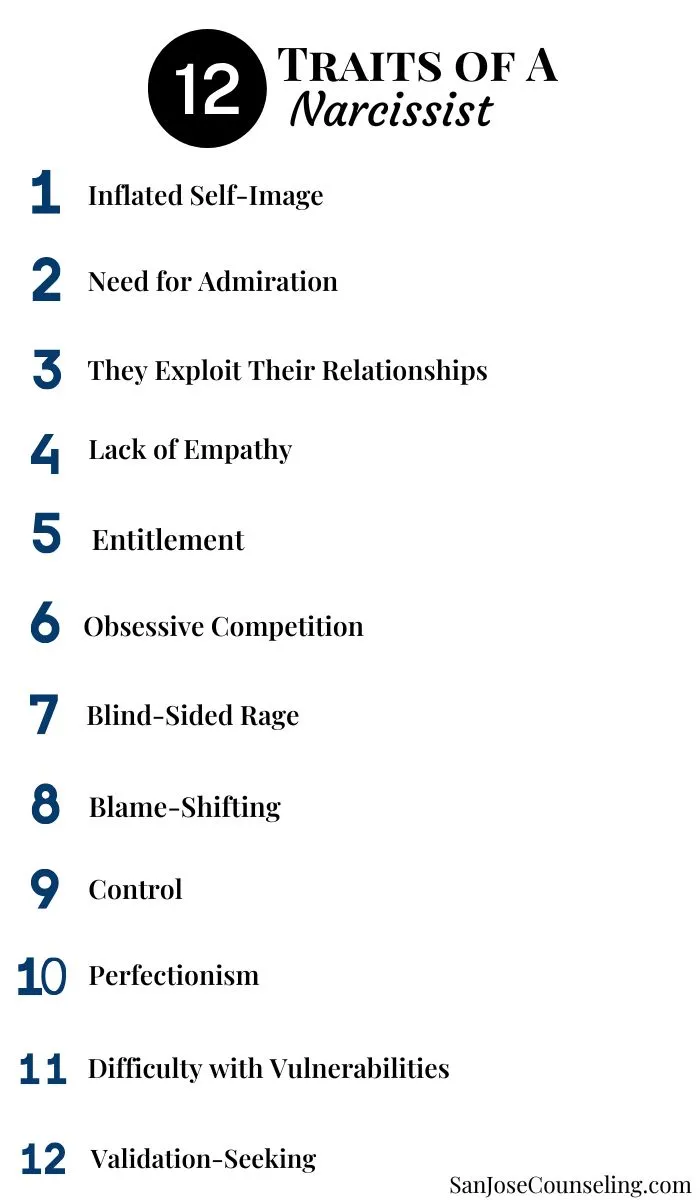Seek Therapy
408-920-1730
Narcissism, Signs and Unique Ways to Dealing with It.
Helping you Spot the red flags in a narcissist
A lot of people today love to throw around the word ‘narcissist,’ but do you really know what it means? If you do, then do you know the traits of a narcissist for which to watch?
It's not simply a matter of people who talk a lot about themselves and their work.
Untreated NPD (narcissistic personality disorder) can actually have a heavily negative impact on one’s personal relationships and others around them.
Do you believe that you or someone you know is struggling with NPD? Reach out to California based licensed marriage and family therapist Dr. Invia for your free consultation today.
What is Narcissistic Personality Disorder?
Narcissistic Personality Disorder is a mental health condition that affects between 1% - 5% of people in the U.S. People who have NPD are often described as having exaggerated feelings of self-importance.
Let’s see the signs that people with NPD often have.
Top 12 Traits of Narcissist
The following are the 12 traits of a narcissist explained by a licensed therapist Dr. Invia.

#1: Inflated Self-Image
As previously mentioned, narcissists tend to have an inflated sense of self-importance.
They consistently view themselves as extraordinary, even in the absence of achievements or abilities to support their beliefs.
In conversation, they will exaggerate these accomplishments and expect to be recognized as superior.
#2: Hunger for Admiration
Narcissists have an insatiable hunger for admiration from anyone and everyone around them.
They constantly seek validation and attention, even if it’s exhausting for those with whom they’re speaking.
Imagine Amelia, a narcissist, talking with her boyfriend. She dominates their conversations, and whenever he shares an accomplishment from work, she questions it or even scoffs.
She quickly steers the conversation back to herself, trying to "one-up" him.
#3: They Exploit Their Relationships
Narcissists view their relationships with others differently than most. While we view the people in our lives as our equals, narcissists perceive others as being almost beneath them.
When meeting someone for the first time, they will identify that person's strengths and consider how they can leverage those for personal gain.
This manipulation will appear subtly and when it does, the narcissist will mask it as concern or their attempt to be helpful. Over time it will escalate to more overt behaviors until you:
(1) Either break away and set boundaries.
(2) You no longer serve a purpose to them.
#4: Lack of Empathy
Narcissists have trouble having empathy for anyone that isn’t themselves. At first (and knowingly), they are capable of showing superficial understanding (where they can pretend to care),but they cannot be genuine.
As an example: Gemma opens up how she is upset over the loss of a loved one.
Her friend, Emily, doesn’t have much of a response. With a quick and somewhat sarcastic, "I'm sorry," Emily then reacts with her own sob story about something that supposedly happened to her in the past, dismissing Gemma's feelings.
#5: Unreasonable Entitlement
Whenever a narcissist does much of anything, they expect unreasonable favorable treatment. They assume automatic compliance with their wishes.
When they don’t get what they want, they react negatively, exploding with anger and disdain when they are denied what they want.
This kind of entitlement affects everything in their life-cutting ties with ‘friends’ who refuse to accommodate their schedule, and crossing someone's boundaries because they don’t think they should apply to them.
#6: They’re obsessed with Winning at Life
A narcissist’s world is divided between the winners and the losers. They are obsessed with the idea of being perceived as someone who constantly wins at life.
Whenever they witness someone close to them achieving success, they are overwhelmed by feelings of envy or jealousy.
They constantly feel the need to compete, even in inappropriate situations, and will go out of their way to not only undermine others, but also avoid celebrating these successes.
#7: Blind-Sided Rage
Narcissists often struggle to maintain stability in romantic relationships. If things remain calm for too long, they may purposely provoke arguments to create excitement.
They might suppress minor issues, even if these don't genuinely bother them, only to explode later over an insignificant event.
This explosion can manifest as a sudden outburst of rage, during which they bring up every perceived weakness or disapproval of their partner's behavior. Such intense reactions can be triggered by seemingly insignificant events that they perceive as threats to their self-image.
#8: They’re Masters in Blame-Shifting
When a narcissist is caught doing something wrong, like cheating on their partner, spreading rumors, or called out for bad behavior, they will shift the blame.
Rather than accepting responsibility, they tend to highlight your past mistakes. This course of action often involves gaslighting and downplaying their own actions to make themselves appear less guilty.
#9: Control
They have a hard time recognizing anyone elses boundaries. However, when it comes to their own, they will rigidly defend them.
They view others’ boundaries as some sort of challenge that they have to overcome, rather than exercise restraint and respect them.
#10: Perfectionism
When dealing with a narcissist, they will spend an excessive amount of time to maintain their personal appearance. They may even go so far as to fabricate stories for their peers, and these stories often contain clear inconsistencies.
Whenever flaws begin to emerge in the facade they present, they will become distressed and can even have a breakdown.
#11: Difficulty with Vulnerabilities
Despite their first impressions, where they come off as socially adept, narcissists struggle with deep connection.
They have a fear of genuine vulnerability, believing that if they are vulnerable with somebody, then they will lose control.
Emotional connection with them are often perceived as rare, or in some cases, even impossible.
#12: They Always Seek Validation
Their need for validation can overtake their relationships. Mike, who has been with his girlfriend Lisa for just a few short months, has begun to notice that Lisa is very insecure.
She doesn’t outright say that, but he can see it through her questioning, such as does he still have feelings for her? He notices that she becomes upset whenever he talks about hanging out with others who aren’t her, such as his friends.
It escalates from a healthy reassurance to him feeling the need to continuously "prove" himself to her, which leads him to walk on eggshells whenever she is nearby.
Read More: When to Walk Away from Someone with Mental Illness
Dr . Invia Shares Unique Ways to Deal with Narcissism
The process of diagnosing Narcissistic Personality Disorder (NPD) is far from simple. It requires a comprehensive evaluation by a qualified mental health professional.
It is crucial to carefully notice their behaviors and specific traits, even those that may seem minor or subtle. Observe attentively how they relate to others in private, as this can differ significantly from their public behavior.
A common red flag for narcissism is when a person swiftly goes from expressing friendship toward someone to criticizing them when they are not around.
If you are aware that someone has been diagnosed with NPD, it is important to do these things to cope effectively:
- Clear Boundaries: Uphold clear boundaries when engaging with them. Maintaining these boundaries without compromise is essential for your own mental health and for fostering a healthier relationship.
- Try Using Gray Rock Method: Another method that is suggested when dealing with a narcissist is the “Gray Rock Method, which involves making yourself seem as uninteresting as possible and not reacting when they attempt to provoke you.”
Remember, only trained mental health professionals can provide a formal diagnosis of NPD, and these observations should not replace professional evaluation and diagnosis.
“Dealing with a narcissist can be one of the most challenging interpersonal situations we face," says the Counseling Center Group. “Whether it’s a family member, romantic partner, or colleague, knowing how to handle a narcissist is crucial for maintaining our mental health and well-being.”
Reach out to Dr. Invia, a professionally licensed marriage and family therapist for your free consultation today.
How We Help You Deal with NPD.
If you have ever been in a romantic relationship with a narcissist, and you feel that you are still deeply traumatized, you need to seek out therapy.
Narcissistic abuse trauma can last months to years without the help of a professional but we have the service in California that can help you recover in a healthy way.
At San Jose Counseling, Dr. Invia, their lead counselor/therapist has years of experience to assist you in managing the emotional impact left by your experiences with a narcissist.
He provides a free video consultation, so that he can learn more about your situation and how he can best help you.
Various therapeutic approaches can be employed, including, but not limited to: talk therapy, and EMDR. Dr. Invia A. Betjoseph provides a wide range of therapeutic services, including individual, couples, and family counseling.
Dr. Betjoseph focuses on what’s important to you, making sure his help fits your needs and goals. He creates a plan just for you, so you can work together on what matters most to you.
Summing Up
It's not easy when someone in your life acts like they're better than everyone else all the time. The purpose of this article is to help you understand how to deal with these people in a good way. Remember, even if someone acts like this, they're still a person with feelings.
Reach out to Dr. Invia, a professionally licensed marriage and family therapist for your free consultation today.
They might not know they're hurting others, or that they need help. They can learn to be nicer, but it takes time and effort. If you think someone you know acts this way, it's a reasonable suggestion to guide them to a counselor.
A counselor can help them learn how to be kinder and get along better with others. This can make life better for them and the people around them.
Everyone deserves a chance to be better, and with the right help, people can change and have healthier relationships.


